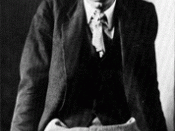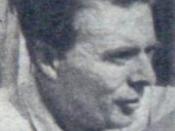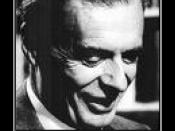Since the genesis of our existence humankind has been progressively distancing itself from nature. With the effects of pollution, deforestation and degradation of the environment dramatically increasing each decade, humanity's dissociation with nature has never been more apparent.
Aldous Huxley's "Brave New World" and Ridley Scott's "Blade Runner" have extrapolated this idea of the disintegration in the relationship between humanity and nature, to create contrasting and dystopic environments, predicting the cataclysmic consequences a world devoid of a natural connection can have upon humanity. 'The texts reveal in different ways the effect of human interference with natural processes and environments.'
'Aldous Huxley's vision of the future is one where natural processes and rhythms have been abandoned to make the world a more stable and prosperous place'.
Both texts illustrate harrowing dystopic futures where the materialistic, scientific and economic ways of thinking have been allowed to extinguish the humanistic religious and philosophic ways of thinking, in the name of progress.
In both texts, the composers question this progress that they were witnessing in their own individual contexts, and correspondingly warn future generations about wandering away from humanity's natural beginnings.
Huxley and Scott criticise their individual contexts which, though half a century apart, deal with similar concerns for humanity and the natural environment. Huxley's context was the aftermath of WWI, where depression and disillusionment saw European countries seeking alternatives to democracy, Totalitarianism. These extreme dictatorial forces promised stability, order and security but at the expense of the essential facets of humanity, that of emotions, freedom of choice, intellectual stimulation and an interconnected relationship with nature. Also, in 1913, Henry Ford founded mass production, maximum efficiency through monotonous conformity. These contextual elements stand as the birth place for Huxley's "Brave New World", a text that satirically explores the irony of...



Well done
A great essay! I'm assuming u did very well in English?
0 out of 0 people found this comment useful.